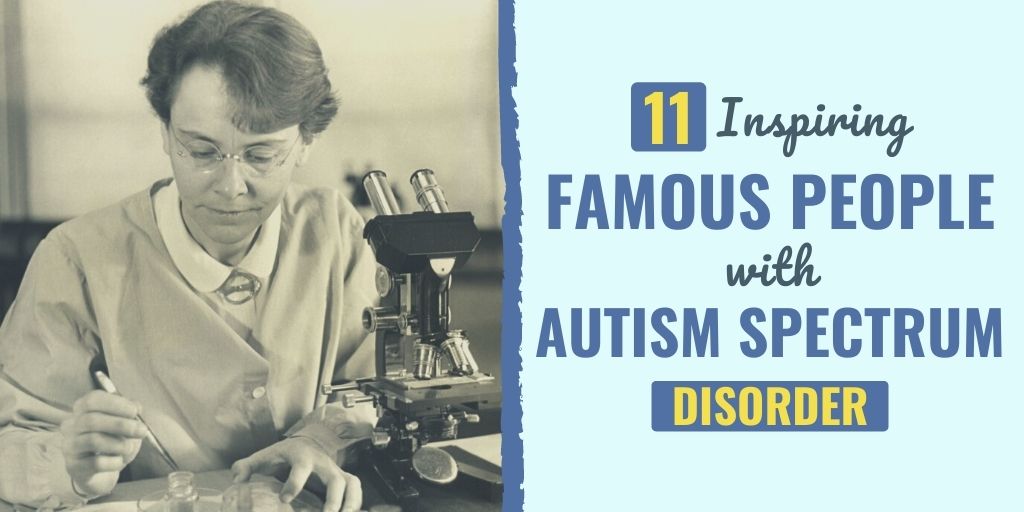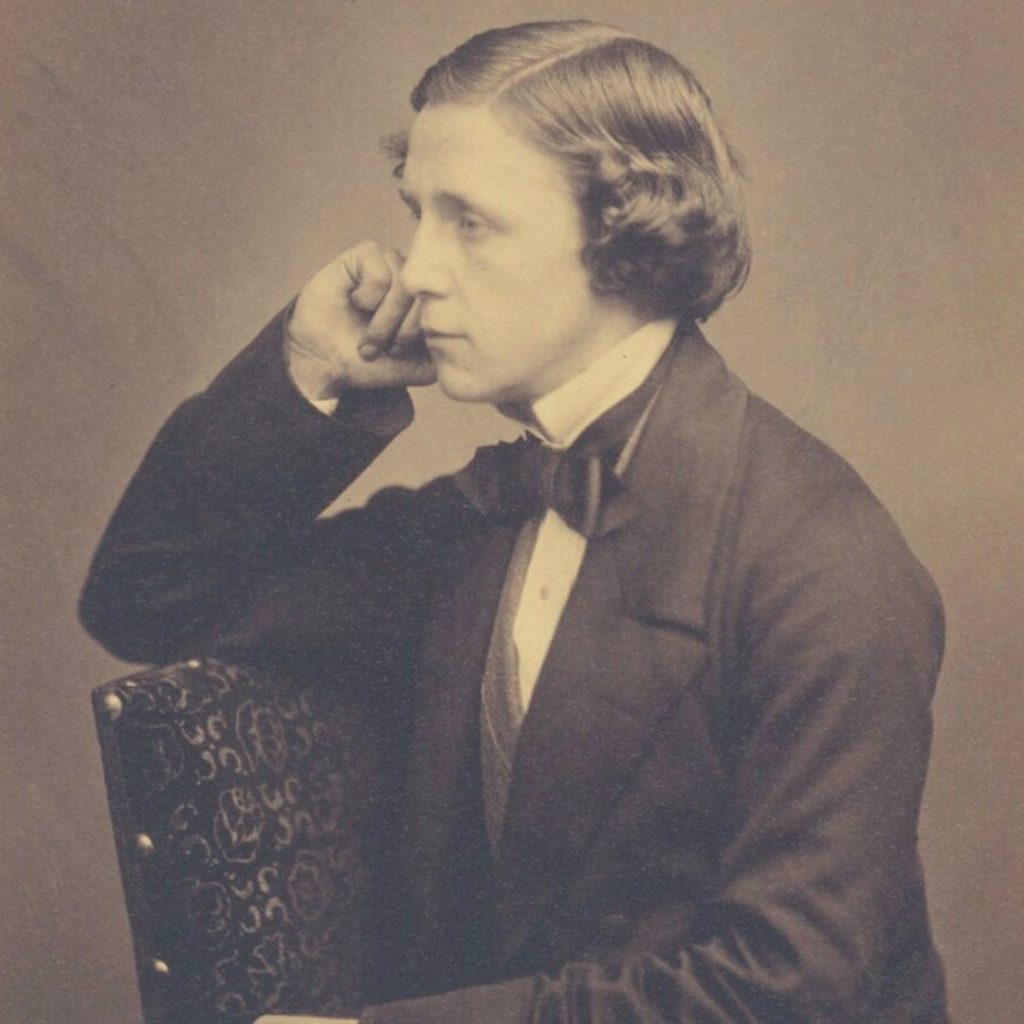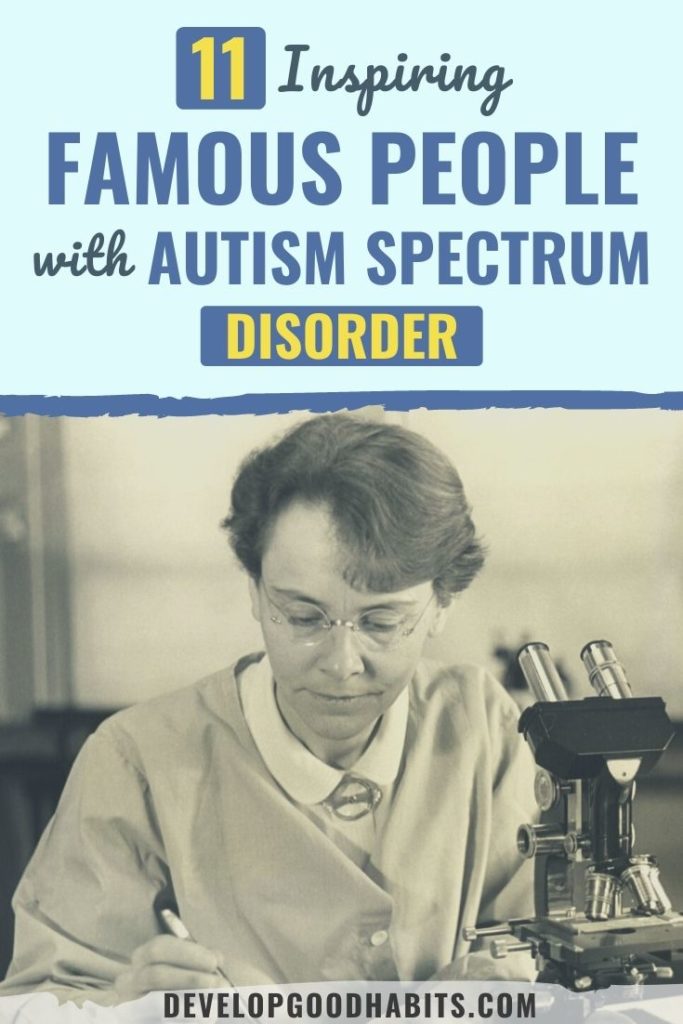Autism spectrum disorder (ASD) is a widely researched disorder that continues to have advancements in understanding and treatment. While it was once assumed to be rare, autism is now thought to affect 1 in every 59 people.
Symptoms of this complex neurobehavioral disorder usually start to show before the age of 3. Characteristics of someone who has autism include:
The severity and pattern of these impairments varies from person to person, which is why professionals refer to this disorder as one that exists on a spectrum. This disorder poses challenges for those who suffer from it, but there are many people who are on the spectrum who have become famous following their success and inspirational journeys.
While it’s easy to focus on the drawbacks of this disorder, consider the unique strengths that someone with autism spectrum disorder can end up with. Those with this disorder are known to have restricted interests, which prompts people with autism to be very interested or passionate about one niche topic, leading to a sense of commitment and focus that can help someone on the autism spectrum excel. Having a wide range of interests, alternatively, can be distracting and limit one’s commitment or focus to any one thing.
Think about how the characteristic “downfalls’ of autism can promote success:
As with other characteristics of this disorder, social skills among those with autism can greatly vary–but in general, those with ASD have a greater tendency to feel overwhelmed in social situations, therefore increasing their time spent alone. The friends that people with ASD do have are often supportive and have similar interests, which can help keep someone with autism focused on their goals.
Given these strengths that a person with ASD may have, it’s not surprising that many people with ASD become very successful. In this article, we will look at the inspiring stories of 11 famous people with autism spectrum disorder who accomplished great things in their lives.
Let’s get started.
11 Inspiring Famous People with Autism Spectrum Disorder
1. Temple Grandin
Born in 1947 before research had advanced on autism spectrum disorder, Temple Grandin grew up with a diagnosis of brain damage. As a child, her father believed that their family should follow medical advice and institutionalize Grandin, however, her mother advocated for her because she didn’t want her daughter to grow up outside of their home. She hired a speech therapist and other personalized support systems to help Temple succeed.
While Temple Grandin didn’t speak until she was three years old, she found her voice and has used it to be an influential writer and speaker on autism rights, neurodiversity movements, and animal behavior. In fact, she was one of the first people with autism who documented her personal experience living with the disorder. Her memoirs were later turned into the movie Temple Grandin, starring Claire Danes.
As a successful professor of animal science, Dr. Grandin has been referred to as “the most accomplished and well-known adult with autism in the world.” She is among the most successful scientists in the humane livestock handling industry.
2. Barbara McClintock
Barbara McClintock is the only woman to date who has been awarded an unshared Nobel Prize in Physiology or Medicine. She was an independent child who was known as being solitary. However, she saw this as a strength and referred to her independence as her “capacity to be alone”.
She discovered her passion for science in high school, where she dreamt of attending Cornell’s College of Agriculture. While her mother opposed, arguing that going to college would make Barbara unmarriageable, her father allowed her to register to follow her passion.
Barbara devoted her life to the study of genetics. Her groundbreaking work showed that genetics are not stationary, but rather they’re subject to alteration. This concept was initially criticized by the scientific community; however, the idea that genes could be rearranged eventually became widely accepted, which awarded McClintock the Nobel Prize in 1983, recognizing her for this and other fundamental contributions she made to the field of genetics. McClintock was also awarded several prestigious fellowships and, in 1944, was elected a member of the National Academy of Sciences.
3. Dan Aykroyd
Dan Akyroyd has led a popular comedic career, starring in a variety of well known shows and movies such as The Blues Brothers, Ghostbusters, and SNL. However, as a child, he had already been expelled from two schools before he was diagnosed with autistic spectrum disorder.
Aykroyd has been relatively transparent with the public about his experience living with autism, and in fact, he has spoken about how his life and experience with this disorder contributed to the creation of his lead character in Ghostbusters. He stated, “One of my symptoms included my obsession with ghosts and law enforcement…I became obsessed [with] Hans Holzer, the greatest ghost hunter ever. That’s when the idea of my film Ghostbusters was born.”
4. Lewis Carroll
While this condition has only recently been studied in depth, there are many historical figures who are thought to have been on the autism spectrum, including author Lewis Carroll. Due to his trouble socializing with adults, it is said that Lewis Carroll spent most of his time with children, which led to his creation of the imaginative story, “Alice’s Adventures in Wonderland.”
Considered a creative genius by many, his difficulty communicating was intensified with a severe stammer, which further suggests his missed diagnosis of autism spectrum disorder. Lastly, Carroll was very talented in math and considered himself to be an inventor of sorts, which are two common characteristics of people who are on the spectrum.
5. Emily Dickinson
Another successful person who lived before the clinical identification of ASD was Emily Dickinson, a well-known, unconventional American poet. Dickinson was known to be reclusive and preferred spending time with children than with adults. She had a unique fascination with white clothing and flowery scents among other things.
Dickinson lived a secluded life, but created remarkable and unique poetry that has helped her maintain a household name over 130 years after her death. Academics wonder if it is because of her autism that she was able to reject gender stereotypes and create such an unconventional body of work that remains famous today due to its originality.
6. Susan Boyle
Susan Boyle surprised the world when she not only appeared on Britain’s Got Talent, but went on to sell over 14 million albums. But she really became an inspiration when she announced that she had been diagnosed with Autism Spectrum Disorder.
Originally diagnosed with brain damage after complications at birth, Boyle experienced bouts of erratic behavior throughout her life. It wasn’t until she was 52 that Boyle learned her true diagnosis of a mild form of autism, which gave her a clearer understanding of why she felt different throughout her life, allowing her to feel more relaxed about herself.
7. Daryl Hannah
Daryl Hannah, known for starring in movies such as Kill Bill and Mermaid, only recently came out about five years ago regarding her autism. Since going public with her experience, Hannah has been an inspiration through her honesty regarding her challenges with life on the autism spectrum.
Daryl reports that when she was a child, her discomfort in social situations caused her to refuse interviews and miss movie premiers. She engaged in self-soothing behaviors as needed, and has grown to live with her diagnosis. Medical professionals recommended that she be institutionalized, but this movie star proved them wrong and went on to act in a number of hit movies.
Studies suggest that girls are likely better than boys at compensating for the characteristic social deficits caused by autism. But, considering Daryl’s success, it may be easy to forget that some people with autism are still constantly working hard to hide it. In fact, Hannah’s struggle became so burdensome that she chose to leave Hollywood in return for a peaceful life where she is more in-tune with nature.
8. Anthony Ianni
Anthony Ianni, a winner of the NCAA National Championship, is now a motivational speaker and inspiration to those in the autism community. Born in 1989, Ianni grew up in a family of collegiate athletes–his father played baseball, his mother played basketball, volleyball, and softball, and his sister played volleyball.
According to his doctors when he was first diagnosed with autism, he was not likely to achieve much in his life. However, he proved them wrong with his success in basketball and as a popular motivational speaker. Despite what others believed about his future and the numerous personal challenges he faced, Anthony never gave up. He earned his Bachelor’s Degree after being told he wouldn’t graduate from high school and he was the first athlete with autism to play NCAA Division One College Basketball.

Anthony has won numerous awards both in basketball and for his speaking engagements, including the 2014 Epling Agent of Change Award and the 2011 Tim Bograkos Walk On Award. Furthermore, he won two Big Ten Championships, earned a Big Ten Tournament Title, and was a member of the 2010 Final Four team.
9. Satoshi Tajiri
Satoshi Tajiri had a fascination for insects as a child, which turned into a career as an adult with his creation of Pokemon. The video game creator has been an inspiration to millions of people worldwide due to his success despite his disability.
Tajiri does not speak about his experience living with autism spectrum disorder in public, rather he chooses to let his success speak for itself. And as the CEO of Game Freak, Tajiri has certainly achieved noticeable success to date.
10. John Elder Robison
John Elder Robison has had a variety of careers, but he may be most known for his famous memoir that detailed his life with undiagnosed autism, Look Me in the Eye. He currently works at the college of William and Mary as the scholar in residence in the department of neurodiversity and is an advocate for autism awareness.
Robison grew up in an abusive household and it wasn’t until he received his diagnosis at the age of 40 when he gained a better understanding of his childhood. Since writing his memoir, Robison has become a leader in advocacy for autism. He works with government agencies such as the US Department of Defense to coordinate autism programs and contribute to the knowledge of this disorder.
11. Tim Burton
Tim Burton has made dozens of obscure, yet widely popular movies that have captured people’s imaginations from around the world. What his fans around the world might not know, though, is that Burton believes he has autism spectrum disorder.
Burton has been described as an introvert and recluse. He preferred solitary activities as a child like painting, drawing, and watching movies, which led to his love of movie production and his successful career.
It wasn’t until he was an adult that Burton’s wife, actress Helena Bonham Carter brought up the possibility of his undiagnosed Asperger’s. And upon looking into it, Burton identified with children who have autism, reporting that was how he felt when he was a child, spending his time solely devoted to his passions.
As a multi award-winning filmmaker, Tim Burton’s works showcase a unique quality that you have to dig into to start to understand–just as you do with autism spectrum disorder.
Final Thoughts on Inspiring People with Autism Spectrum Disorder
ASD hasn’t held these successful people back from living up to their potential. In fact, it’s the nature of the disorder that could have played a part in their achievements. And that’s pretty amazing considering that what characterizes this disorder–a weakness in communicating on par with social norms–is also what has helped inspire these famous people to bring people together through their creativity.
These iconic people we have talked about today are role models for those in the autistic community and other people who may be doubting their ability to succeed. Hopefully their stories have inspired you to go after what you want in life.
If you're looking for more inspiration, check out these other posts:
- 9 Successful People with Dyslexia
- 45 Famous Failures Who Became Successful People
- 11 Successful and Famous People with Disabilities
- 9 Successful People with Obsessive-Compulsive Disorder (OCD)
Finally, if you want to take your goal-setting efforts to the next level, check out this FREE printable worksheet and a step-by-step process that will help you set effective SMART goals.



